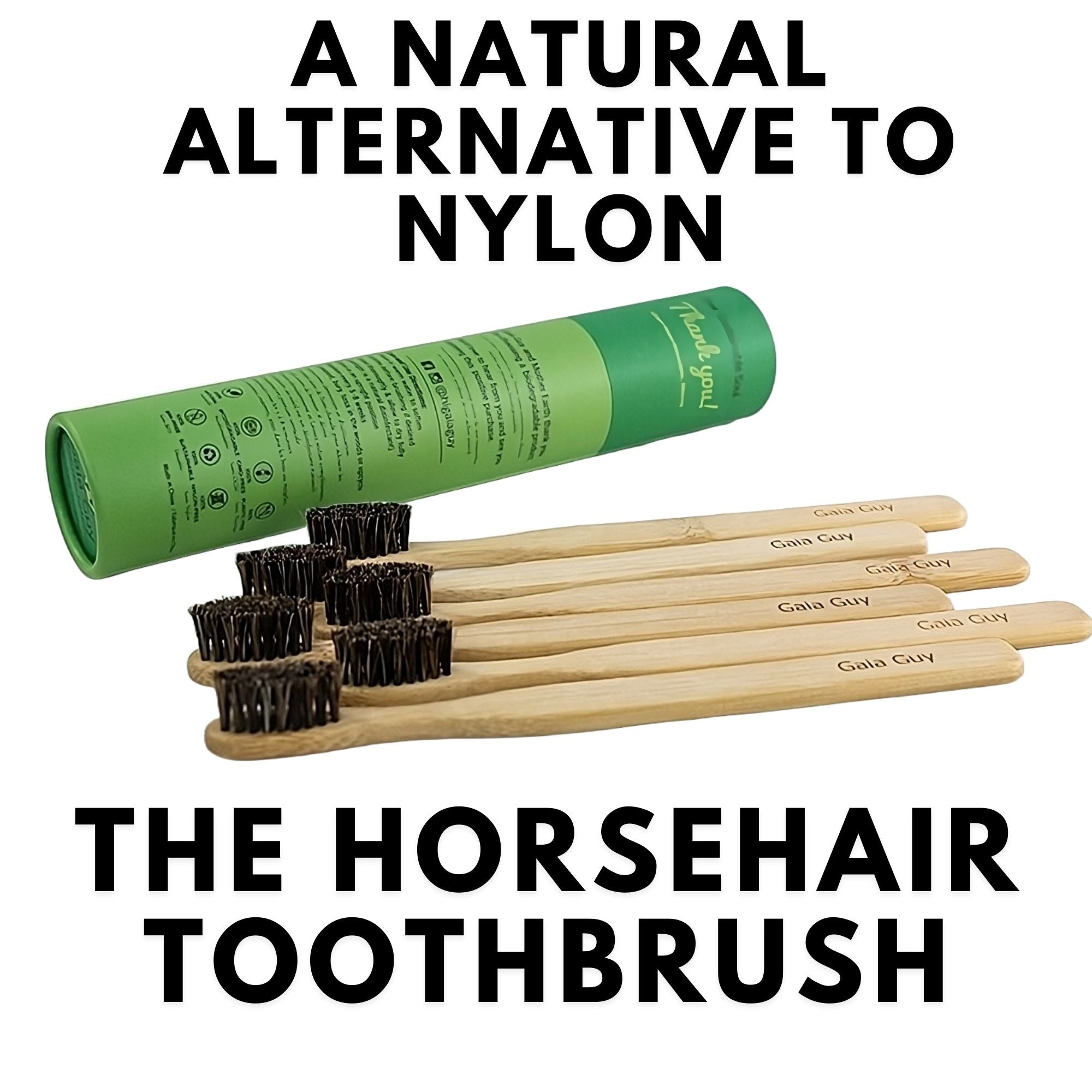
Toothbrushes have a long and varied history, evolving from simple tools made of twigs or animal bones to today’s modern nylon-bristled versions.
The toothbrush as we know it became more common in the 20th century, with nylon bristles rising in popularity due to their affordability and durability.
However, with the increased focus on health, sustainability and natural living, there’s been a resurgence of interest in boar bristle toothbrushes and horsehair bristle toothbrushes—a traditional, eco-friendly alternative.
Benefits of Horsehair Toothbrushes:
Many are turning to horsehair toothbrushes for their natural, gentle bristles and biodegradable properties. Unlike nylon, horsehair is completely compostable, making it an appealing choice for those looking to reduce their plastic waste.
Horsehair bristles are also softer, which makes them ideal for people with sensitive gums, and they may even contribute to improved oral health by being less abrasive on tooth enamel. Beyond practicality, horsehair toothbrushes have cultural significance, often handmade by artisans, and evoke a sense of tradition and craftsmanship.
Key benefits include:
- Natural and biodegradable: A more sustainable option compared to plastic-based toothbrushes.
- Gentle on gums: Softer bristles help protect sensitive gums from irritation.
- Cultural significance: A handcrafted tool with roots in history, often passed down through generations.
Considerations:
Of course, horsehair toothbrushes aren’t without their challenges. They tend to be more expensive than cheap mass-produced nylon toothbrushes. However, the environmental cost of petroleum based plastic toothbrushes isn't factored in.
Things to keep in mind:
- Higher cost: Marginally more expensive as natural materials typically come at a higher price.
- Availability: Limited sources make it harder to find a reliable supply.
- Maintenance: Needs to dry out fully between uses, but that could be said for all toothbrushes to be hygienic
Comparison to Nylon Toothbrushes:
When compared to modern nylon toothbrushes, horsehair toothbrushes offer a different set of advantages. While nylon bristles can be stiffer and more durable, horsehair bristles provide a softer, more gentle brushing experience. The environmental impact of nylon is significant, as most nylon toothbrushes are not biodegradable. On the other hand, horsehair toothbrushes have a smaller ecological footprint but may not last as long.

Comparing key factors:
- Bristle stiffness: Horsehair is softer and more flexible than boar hair and comparable with soft to medium nylon bristles.
- Cleaning effectiveness: Both can effectively clean teeth, but brushing technique matters more than bristle material.
- Durability: Nylon toothbrushes tend to last longer than horsehair, which may need replacing sooner.
- Environmental impact: Horsehair is fully biodegradable, while nylon contributes to plastic waste.
Choosing the Right Horsehair Toothbrush:
If you’re interested in trying a horsehair toothbrush, there are a few things to consider when choosing the right one. Pay attention to the handle material—wood or bamboo is often used to complement the natural bristles. The density of the bristles is also important; some prefer denser brushes for a firmer feel, while others enjoy the softness of fewer bristles. Lastly, the size of the brush head can make a difference in how comfortable it feels in your mouth.
Factors to consider:
- Handle material: Look for eco-friendly handles like wood or bamboo.
- Bristle density: Choose based on your preference for a firmer or softer brushing experience.
- Brush head size: Ensure it fits comfortably in your mouth for effective cleaning.
Caring for a Horsehair Toothbrush:
Taking care of a horsehair toothbrush is key to ensuring its longevity and hygiene. Regularly clean and disinfect the bristles by rinsing them thoroughly with water after each use and allowing the brush to dry in a well-ventilated area.
Avoid storing it in an enclosed container where moisture can cause bacterial growth. Replace the brush every few months or when the bristles become worn.
Key care tips:
- Cleaning: Rinse thoroughly after each use and disinfect regularly.
- Storage: Keep in a dry, ventilated place to prevent bacterial growth.
- Replacement: Replace every 2-3 months or when bristles wear out.
FAQs:
-
Are horsehair toothbrushes safe to use? Yes, as long as they are cleaned and stored properly to avoid bacterial growth.
-
Do horsehair toothbrushes clean teeth as effectively as nylon toothbrushes? Yes, with proper brushing technique, horsehair toothbrushes can clean teeth just as effectively.
-
Are there any health risks associated with using horsehair toothbrushes? If not properly cared for, bacteria can build up on the bristles, but regular cleaning minimizes this risk.
-
How often should I replace my horsehair toothbrush? Replace your horsehair toothbrush every 2-3 months or when the bristles begin to show signs of wear.
-
Where can I buy a horsehair toothbrush? They are available from Gaia Guy right here or you can buy horse hair toothbrush on amazon for your convenience.
-
Are horsehair toothbrushes cruelty-free? Horsehair is typically obtained humanely, often from grooming processes rather than harming the animal.
-
Can I use a horsehair toothbrush with electric or sonic toothbrushes? Horsehair bristles are usually not compatible with electric toothbrush heads. We may develop this so leave a comment if you are interested.
-
Are there any specific brushing techniques recommended for horsehair toothbrushes? The same gentle circular brushing motions used with nylon toothbrushes are effective with horsehair brushes.
Conclusion:
Horsehair toothbrushes are a natural, eco-friendly alternative to nylon brushes, offering a gentler brushing experience and a smaller environmental footprint. While they require more care and tend to be more expensive, their sustainability and connection to tradition make them an appealing choice for those looking to minimize plastic waste. By weighing the benefits and considerations, you can decide if a horsehair toothbrush is right for you and your future.












2 comments
Lorelei-Kai Schurman
Interested in rotary head/electric toothbrush version. Hope y’all are able to find a good way to do that.
James M
Given the significant reduction of dental caries and decay with using an electric toothbrush in comparison with a manual toothbrush (and given the waste involved in replacing a whole toothbrush every 2-3 months), it would be ideal, amazing indeed, if a replacement head could be developed that was compatible with either OralB and/or Philips style electric toothbrushes (a number of bamboo heads have already been developed, so its feasible, but these all contain either nylon or bioplastic bristles alas).